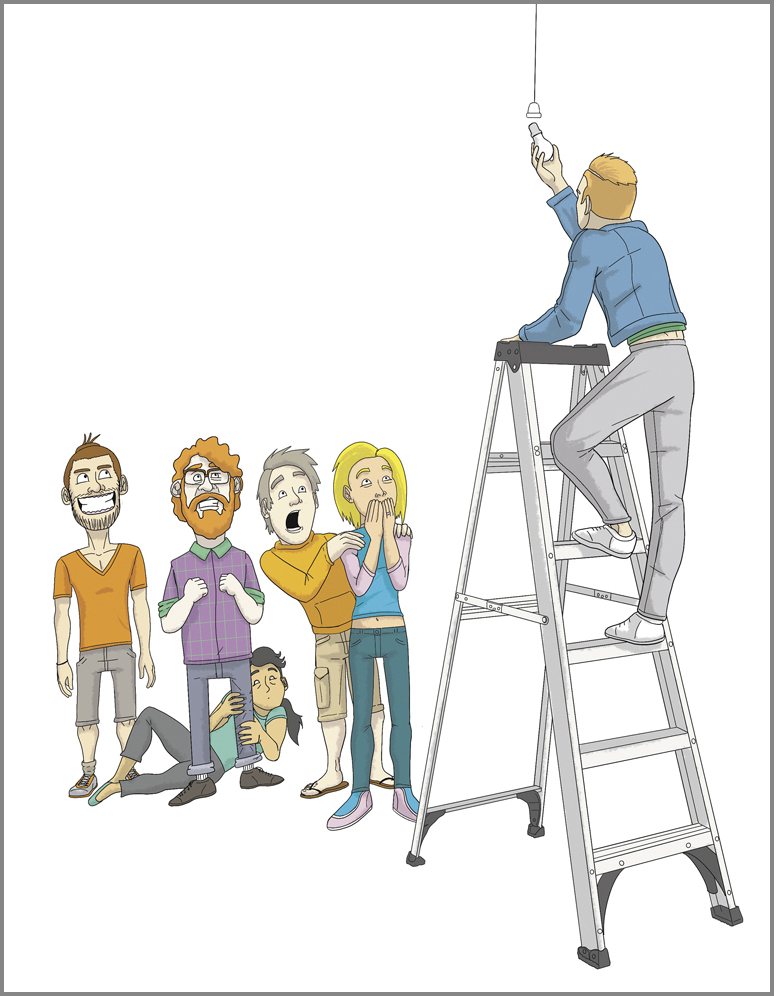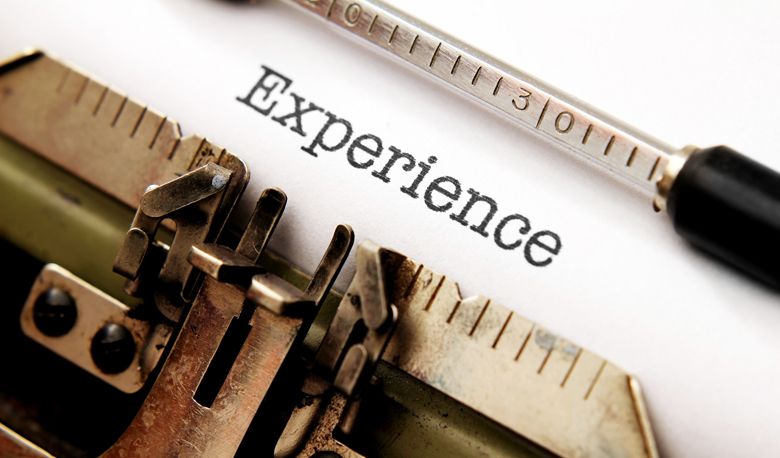California Punchline
A glass of wine is not an experience
There was a time in America, not long ago, when humor based on identity was acceptable and made everyone laugh before the politically correct posse plunged its dagger into the heart of Americans’ ingrained goodwill. We told ethnic jokes, a portmanteau for a virtual Ellis Island of fairly benign recognition of national or religious differences. People could joke around without an attorney or some justice fanatic hectoring them or asking for reparations.
The trope comprises of a light bulb and more than one person in the room. Quips the Beaver fan, “How many Ducks does it take to change a light bulb? One to hold the bulb and five to turn the ladder.” Here’s another variant: “How many New Yorkers does it take to screw in a light bulb? None of your business!” Or this version: “How many Mafiosi does it take...? One to whack the bulb and six who didn’t see or hear anything.”
Bald or hirsute, short or tall, there’s always a light bulb and a punchline. Here’s one more: “How many Californians does it take to change a light bulb? One to screw it in and five to share in the ‘experience.’”
Lest we tumble into the rabbit hole of op-ed pundits or humorless explicators of victimhood, we can say with confidence the California punchline is all about sharing, about the commune, about T-group or any variant on the collective. This is dystopian if wheedled into our sense of “experience” as we will explore below. My purpose is not to walk out on the wing for how a word gets trashed but to provide rock-solid sense to demystify drinking wine.
Bumper-sticker polemicists once urged us to “question authority.” That done, the same mantra-makers urged us to “experience sharing” everything from Jesus to soccer matriarchy. Always the experience was prescribed by someone else. This is inimical to the origins of this word, also connected to “expert,” “expertise” or “experiment.”

“Experience,” however, in wine country is no laughing matter, but instead a buzz word, a cliché, a default place holder for some unformed slogan. Inside my virtual mailbox, I’ve collected some examples of the E-word gone rogue. We see how marketing blather undermines not only the meaning of the word, but turns it on its ear.
Others have borne witness to this same malediction. Philosopher of language J.L. Austin wrote, circa 1960, “We have here, in fact, a typical case of a word, which already has a very special use, being gradually stretched, without caution or definition or any limit, until it becomes, first perhaps obscurely metaphorical, but ultimately meaningless.”
When a stretch serves slonganeering and case sales, it starts to stick like Velcro.
From California arrives this announcement: Vinesse, an affinity marketing company acquires Touring and Tasting. From the news release, the gushy words flood the lowlands of our minds: “100 percent devoted to wine tourism and helping people discover the best experiences wine country has to offer. There’s never been a better time to be in the vibrant wine tourism industry, which is growing on a global level.” Superlatives abound — “100 percent,” “best,” “vibrant” and growth “on a global level.” Inflated? It’s like English as Viagra. “Experience,” herein and below, must exceed, i.e., be the “best.”
Last winter, I received this note from a winery in the Dundee Hills, which legitimately boasts of its topography and well-made wines: “Dear Kenneth, We are pleased to announce our 2019 Calendar of Events for the year! Whether you live locally or out of state, we have put together several exciting opportunities to join us for an unforgettable experience, and we hope you will be able to make it.” The modifier here makes me think of Natalie Cole dubbing with long-defunct dad, Nat, in a mellow pop chart-topper. Experiences, by definition, are supposed to be unforgettable. That is the point.
When once-transitive verbs dress like nouns, there begins a slide from clarity of thought to a kind of gruel. To slither away from one meaning, marketers’ and other promoters go to the inflated valueless terms like blue flies to merde. Then the overdressing becomes nutty, a parody of itself.
A well-known winery in the Willamette Valley, also an innovative and highly visible company to which its loyalty club I nominally belong, included seven mentions of “experience” in an e-mail sent this February. This count must be a record. Here are the pertinent bits from the communique: “We announce the launch of two new elevated experiences designed to enhance your wine tasting experience … We also offer private yoga sessions to open up the senses helping you smell, taste and experience wine more deeply…We hope you’ll join us for one of our new experiences … Enjoy an unforgettable sensory experience of wine and food … This hour-long experience features a selection of small-lot wines hand-selected to match the flavor profiles of four small plates … To ensure an intimate experience, our pairings are limited to six guests.”
Good members in their respective communities and industries, one wonders how far afield these players have unknowingly wandered from the sense of the word introduced in Chaucer’s day, circa 1377, like a kid overly eager to use “experience” in a sentence. For instance, the yoga add-on suggests that drinking wine is not enough, and is a sop to Millennial and aged Boomers who need something to do when drinking wine because research says (1) they bore easily and (2) they want a story to tell at a later date on the links or over some box wine at dinner.
How does this foolery make it into the marketplace?
Etymology studies word origins and their mutations, or variants, over time. It is akin to Jancis Robinson’s book, “Wine Grapes,” tracing migrations and redistributions of basic conditions of use. Using etymology websites, you can explore the word and reveal the roots of “experience,” which helps make my case.
Word origins aren’t identical to varietals introduced to a region, such as Alicante Bouchet giving way to Cabernet Sauvignon in Napa Valley. The entry quoted holds interest as much for the way the primary meaning gets upstaged by its opposite, from an act of self-directed volition, instead becomes a reaction defined by an outside party with such responses pre-set.
According to etymonline.com, experiri (Latin): “to try, to test;” begat experientia (also Latin): “a trial, proof, experiment; knowledge gained by repeated trials;” which brought about esperience (Old French, 13th century): “experiment, proof, experience;” which afforded experience (14th century): “observation as the source of knowledge; actual observation; an event which has affected one.”
Here is the textbook use of the word as noun and verb: knowledge purchased by doing or seeing something. A child near a hot stove burner probably needs only one encounter to become handy at keeping oneself from the source of direct heat. Likewise, an “experience” packaged and sold to us by third parties doesn’t enhance our character or sensibility. It simply gets consumed as a shared experience, like being on hand for the changing of a lightbulb.
In other respects, responding as part of a group limits our capacity to respond at all, since the “experience” we buy into has narrow parameters rigged to elicit response.
Rigged for what? To get you into the tasting room for an experience. And what about the wine? Well, that glass you’re swirling is just a little training on your way to a bike trail, or a waterfall, or a farmers’ market selling you crafted marmalade and local tribe leather holders for your iPhone — even a pad for your meditation. Paradoxically, an “E-package” bringing affinity groups together will short circuit the genuine sensual engagement of wines since the group response will likely overcome individual impressions. This is not your “getting to be handy,” but more like mind control.
Accumulated knowledge maps your experience; drinking wine will not shut out from this cycle of trying and responding. It’s always the inner game that matters. Tasting wine is convivial and social; these attributes do comprise aspects of entertainment rather than logging more experience mileage.
Experiences accrue, but not like slide caddies of vacations past. They are incremental, personal, relational and expressed by utility and value. We learn, we don’t just sop it up. If we are the medium, the wine is the message. And since we differ as individuals, the mediation and response of me or you to the same wine can share qualities without being unilateral.
We experience wines to learn their origins and style, bringing to these actions the sum of what we already know and prefer. An off-the-rack experience only moves glasses or cases of wine. It does not move souls.
From these assays, experiments, trials and such, we learn and remember. Imagine such experiences as walking the vineyard in the morning. In other words, we don’t need a ride in a balloon above vineyards or a spa retreat to develop our taste memories and establish our wine drinking preferences. We don’t need a package imposed on us.
Remember this when you uncork the next bottle of wine. It will provide a glass of wine, not an experience. And when you put the corkscrew into the top, remember to turn it and not the room.











